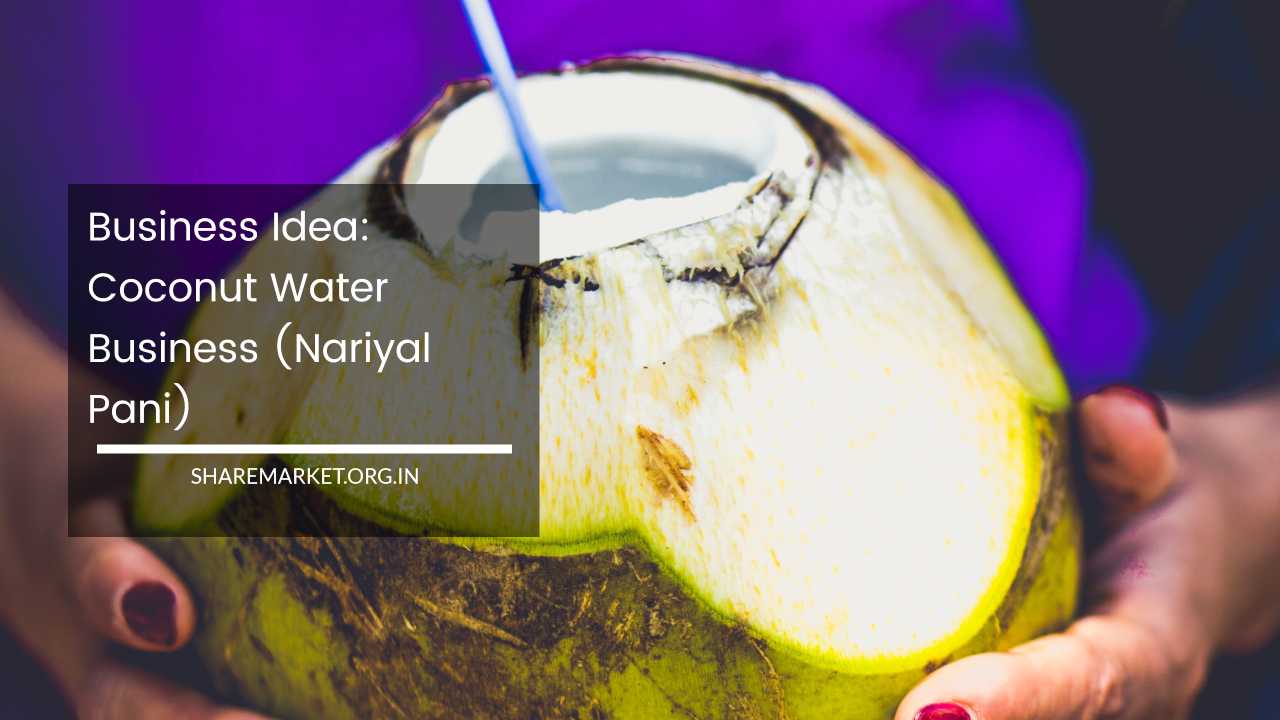Business Idea: Coconut Water Business (Nariyal Pani)

Coconut Water Business
Business Idea: Coconut Water Business (Nariyal Pani)
Coconut water, often hailed for its refreshing taste and numerous health benefits, is becoming increasingly popular in today’s health-conscious world.
The natural, hydrating beverage offers essential nutrients, including electrolytes and vitamins, making it a sought-after choice for those looking to maintain their health and hydration.
For entrepreneurs looking to dive into the beverage industry on a budget, starting a coconut water business can be a promising opportunity.
With an initial investment of just Rs 15,000, it’s possible to create a successful venture that not only meets market demand but also generates significant monthly profits.
1. Market Research and Planning
Market Research
Before launching any business, it’s crucial to conduct comprehensive market research. This process involves:
- Assessing Demand: Analyze the demand for coconut water in your target area. Look into current consumption trends and the popularity of coconut water compared to other beverages.
- Identifying Target Customers: Determine who your potential customers are. Are they health enthusiasts, fitness freaks, or everyday consumers looking for a refreshing drink? Understanding your audience will help tailor your business strategies effectively.
- Analyzing Competitors: Identify existing competitors and their offerings. Note their pricing strategies, product quality, and customer service. This analysis will provide insights into what works and what gaps you can fill in the market.
- Regulations and Permits: Research local regulations regarding the sale of beverages. Understand what permits or licenses are required to operate a food or beverage business legally. Compliance with health and safety standards is crucial for long-term success.
Business Plan
Developing a detailed business plan is essential for outlining your business goals and strategies. Your plan should include:
- Goals and Objectives: Define short-term and long-term goals for your business. What are you aiming to achieve in the first month, year, and beyond?
- Financial Projections: Estimate your initial investment, recurring costs, and potential revenue. Calculate break-even points and profitability projections to ensure your business model is financially viable.
- Marketing and Sales Strategies: Outline how you plan to attract and retain customers. Include strategies for pricing, promotions, and distribution channels.
2. Sourcing Coconuts and Equipment
Sourcing Coconuts
The core of your business will be the coconuts themselves. To ensure a steady supply of high-quality coconuts:
- Local Suppliers: Establish relationships with local coconut farmers or suppliers. Negotiating directly with them can often result in better pricing and consistent supply.
- Quality Checks: Ensure that the coconuts you purchase are fresh and of high quality. High-quality coconuts will yield better-tasting coconut water and help maintain your brand’s reputation.
Equipment
Investing in the right equipment is crucial for efficient operations. The basic equipment needed includes:
- Coconut Cutters: Sharp and durable tools for opening coconuts and extracting the water.
- Knives: High-quality knives for cutting and handling coconuts.
- Storage Containers: Clean, food-grade containers for storing coconut water.
- Refrigeration Units: Essential for keeping the coconut water fresh. Depending on your scale, this could range from a small refrigerator to a larger commercial unit.
3. Establishing a Small Shop or Stall
Choosing a Location
The location of your business plays a significant role in its success. Consider the following when selecting a spot:
- High Foot Traffic Areas: Opt for locations with significant pedestrian traffic, such as busy streets, shopping centers, or recreational areas. High visibility can lead to more customer engagement.
- Budget-Friendly Options: If your budget is limited, starting with a small shop or portable stall can be a cost-effective option. Ensure that the location has access to necessary facilities like water and waste disposal.
Setup
When setting up your shop or stall:
- Visibility and Attraction: Create an inviting setup with clear signage and an attractive display of your coconut water offerings.
- Permits and Utilities: Ensure that your location complies with local regulations and that you have the necessary permits. Arrange for essential utilities, including water and electricity.
4. Hygiene and Quality Control
Hygiene Practices
Maintaining high hygiene standards is crucial for both customer satisfaction and health safety:
- Clean Environment: Ensure that your workspace is clean and sanitized. Regularly clean all surfaces, utensils, and equipment.
- Proper Handling: Train staff to handle coconuts and coconut water with clean hands and sanitized tools to prevent contamination.
- Storage: Store coconut water in clean, covered containers and refrigerate it promptly to maintain freshness.
Quality Control
Implementing strict quality control measures ensures that your coconut water consistently meets high standards:
- Regular Checks: Regularly inspect the quality of coconuts and coconut water. Look for any signs of spoilage or contamination.
- Feedback Loop: Collect customer feedback and use it to make improvements. Address any issues promptly to maintain customer satisfaction.
5. Pricing and Marketing Strategy
Pricing Strategy
Setting the right price is crucial for balancing profitability with competitiveness:
- Cost Analysis: Calculate the total cost of production, including coconuts, labor, and operational expenses. Determine your desired profit margin.
- Market Rates: Research the pricing of similar products in your area. Set a price that reflects the quality of your product while remaining competitive.
Marketing Strategy
Effective marketing is essential for attracting customers and building your brand:
- Social Media: Utilize social media platforms to promote your business. Share engaging content, such as health benefits of coconut water and customer testimonials.
- Local Advertising: Consider local advertising options such as flyers, posters, and banners. Partner with local businesses or events for cross-promotion.
- Word-of-Mouth: Encourage satisfied customers to refer friends and family. Offer incentives or discounts for referrals to build a loyal customer base.
6. Customer Experience and Expansion
Customer Experience
Creating a positive customer experience is key to building a loyal customer base:
- Friendly Service: Train staff to provide friendly and knowledgeable service. Understanding the health benefits of coconut water and being able to recommend it to customers can enhance their experience.
- Atmosphere: Ensure your shop or stall is welcoming and comfortable. A clean and pleasant environment encourages customers to return.
Expansion
As your business grows, consider opportunities for expansion:
- Product Variations: Introduce new flavors or packaging options to attract a wider audience. For example, offering flavored coconut water or eco-friendly packaging can differentiate your brand.
- Retail Partnerships: Explore partnerships with local retailers or health stores to expand your reach. Wholesale agreements can also provide additional revenue streams.
7. Legal and Regulatory Considerations
Compliance
Ensuring legal and regulatory compliance is essential for operating a legitimate business:
- Licenses and Permits: Obtain all necessary licenses and permits required to sell beverages. This may include health and safety permits and business operating licenses.
- Food Safety Standards: Familiarize yourself with local food safety standards and ensure your business adheres to them. Regular health inspections may be required to maintain compliance.
Labeling Requirements
If you plan to package coconut water for retail sale:
- Label Information: Ensure that your product labels include all required information, such as ingredients, nutritional facts, and expiration dates.
- Health Claims: Avoid making unverified health claims on your labels. Ensure that any claims are supported by evidence and comply with local regulations.
Cost of Starting a Coconut Water Business
Starting a coconut water business can be relatively low-cost compared to other food and beverage ventures. The primary expenses include:
- Initial Investment: The initial investment of Rs 15,000 can cover the cost of coconuts, basic equipment, and initial marketing efforts.
- Operational Costs: Consider ongoing costs such as purchasing coconuts, utilities, and staff wages. These costs will vary based on the scale of your operations and location.
Seating Area
If feasible, setting up a seating area can enhance the customer experience:
- Comfort: Provide comfortable seating options and, if possible, add fans or coolers to improve customer comfort.
- Increased Sales: A seating area can encourage customers to spend more time at your establishment, potentially increasing sales. It can also attract more foot traffic due to the appealing environment.
Earning Potential from Coconut Water
With a focus on cleanliness and quality, you can position your coconut water as a premium product. For instance:
- Pricing Strategy: By offering a high-quality product, you can charge a premium price. For example, charging Rs 110 for a serving of coconut water compared to a roadside price of Rs 50-60 can be justified by superior quality and service.
- Revenue Estimates: Based on market rates and customer demand, you have the potential to earn approximately Rs 70,000-80,000 per month. This estimate assumes a steady stream of customers and efficient business operations.
Final Remarks
Starting a coconut water business with a budget of Rs 15,000 is a viable and promising venture. By conducting thorough market research, sourcing high-quality coconuts, maintaining strict hygiene standards, and implementing effective marketing strategies, you can build a successful and profitable business.
With dedication and continuous improvement, you have the potential to generate significant monthly profits while providing a refreshing and nutritious product to your customers.
The coconut water business not only offers a chance to capitalize on the growing demand for healthy beverages but also allows you to make a positive impact on your community by offering a natural and refreshing alternative to sugary drinks.
By focusing on quality, customer satisfaction, and strategic growth, you can turn your coconut water business into a thriving enterprise.

















